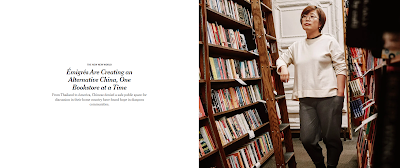Người di cư tạo ra một Trung Quốc mới, từng hiệu sách một
từ Thái Lan đến Mỹ, người Trung Quốc bị từ chối không gian công cộng an toàn để thảo luận ở quê nhà đã tìm thấy hy vọng trong cộng đồng hải ngoại
----
On a rainy Saturday afternoon in central Tokyo, 50 or so Chinese people packed into a gray, nondescript office that doubles as a bookstore. They came for a seminar about Qiu Jin, a Chinese feminist poet and revolutionary who was beheaded more than a century ago for conspiring to overthrow the Qing dynasty (triều đại).
Public discussions like this one used to be common in big cities in China but have increasingly been stifled (bị bóp nghẹt) over the past decade. The Chinese public is discouraged from organizing and participating in civic activities.
From Tokyo and Chiang Mai, Thailand, to Amsterdam and New York, members of the Chinese diaspora are building public lives that are forbidden in China and training themselves to be civic-minded citizens (những công dân có tinh thần công dân) — the type of Chinese the Communist Party doesn’t want them to be. They are opening Chinese bookstores, holding seminars and organizing civic groups.
In the decade after Xi Jinping took over the country’s leadership in late 2012, all of these initiatives were crushed. Investigative journalists lost outlets for their work, human rights lawyers were jailed or disbarred, and bookstores were forced to shut their doors. Ren Zhiqiang, the property tycoon who started the book club, is serving 18 years in jail for criticizing Mr. Xi. Organizers of nongovernmental organizations and L.G.B.T.Q. and feminist activists were harassed (bị quấy rối), silenced or forced into exile.
On the same Saturday in January as the seminar at Mr. Li’s bookstore in Tokyo, eight young Chinese sat around a dining table in the house of a Japanese professor to discuss the Taiwan election that was held the previous weekend. They’ve been meeting at public and private events since last year.
source: nytimes,



Post a Comment